Did you know that over 80% of Airbnb hosts have experienced issues with guests, ranging from property damage to unauthorized parties? Effective guest screening is critical to mitigate these risks and ensure a positive experience for both you and your renters. In this comprehensive guide, we’ll explore essential techniques for vetting potential guests, unlocking the benefits of thorough verification, and safeguarding your vacation rental or property.
Proper guest screening not only protects your investment but also fosters a reputation for reliability and quality service on vacation rental platforms. By implementing a streamlined screening process, you can confidently welcome the right guests, reduce liability, and create an environment of trust and enjoyment for all.
Key Takeaways
- Understand the importance of guest screening to protect your property and reputation
- Discover the benefits of effective screening, including reduced risks and enhanced guest experiences
- Learn the key elements of a comprehensive guest screening process, including identity verification and background checks
- Explore the types of properties that require the most thorough guest screening
- Develop effective guest screening criteria that align with your property’s unique needs and legal requirements
Understanding the Importance of Guest Screening
Effective guest screening is a vital component in maintaining the property protection, securing bookings, and mitigating risks for property owners. By thoroughly vetting potential guests, you can ensure that your property is entrusted to responsible individuals who will respect the space and abide by your established rules.
Benefits of Effective Screening
- Reduced risk of property damage or excessive wear and tear
- Improved guest experiences through compatibility matching
- Enhanced reputation and trustworthiness of your property
- Increased bookings and occupancy rates due to secure bookings
- Minimized liability and legal issues stemming from guest-related incidents
Risks of Inadequate Screening
Neglecting to thoroughly screen guests can expose property owners to a range of risks, including:
- Property damage – Unvetted guests may be more likely to mishandle or abuse your property, leading to costly repairs and replacements.
- Disruptions and complaints – Incompatible guests can cause nuisance issues, negatively impacting the experience of other renters.
- Legal liability – Failure to screen guests adequately may result in liability concerns in the event of guest-related incidents or violations.
- Reputational damage – Poorly managed guest experiences can tarnish the reputation of your property, making it difficult to attract future bookings.
By understanding the importance of guest screening, property owners can take proactive steps to safeguard their investments, mitigate risks, and deliver exceptional experiences for their guests.
Key Elements of a Guest Screening Process
Ensuring the right fit for your property starts with a comprehensive guest screening process. This multi-faceted approach goes beyond just verifying a guest’s identity – it also involves conducting thorough background checks and assessing their financial history. By taking these crucial steps, property owners can minimize risks and attract responsible tenants who will respect the space and uphold their end of the rental agreement.
Identification Verification
The first step in the guest screening process is to verify the identity of the prospective tenant. This typically involves requesting a valid government-issued ID, such as a driver’s license or passport. Carefully reviewing the ID can help detect any potential discrepancies or fraudulent information. Additionally, cross-referencing the guest’s personal details with publicly available databases can provide an added layer of validation.
Background Checks
A thorough background check is a crucial component of the guest screening process. This involves accessing comprehensive reports that delve into the guest’s criminal history, credit score, and any previous evictions or legal disputes. By scrutinizing this information, property owners can gain valuable insights into the guest’s reliability and trustworthiness, allowing them to make informed decisions about extending rental opportunities.
Financial History
Assessing a guest’s financial history is another essential element of the screening process. This includes verifying the guest’s income sources, employment status, and credit history. Property owners can request documentation such as pay stubs, bank statements, or credit reports to ensure the guest has the financial means to consistently meet their rental obligations. This helps mitigate the risk of late or missed payments, which can have serious consequences for the property owner.
By incorporating these key elements into the guest screening process, property owners can cultivate a pool of responsible and reliable tenants, ultimately protecting their investment and fostering positive guest experiences.
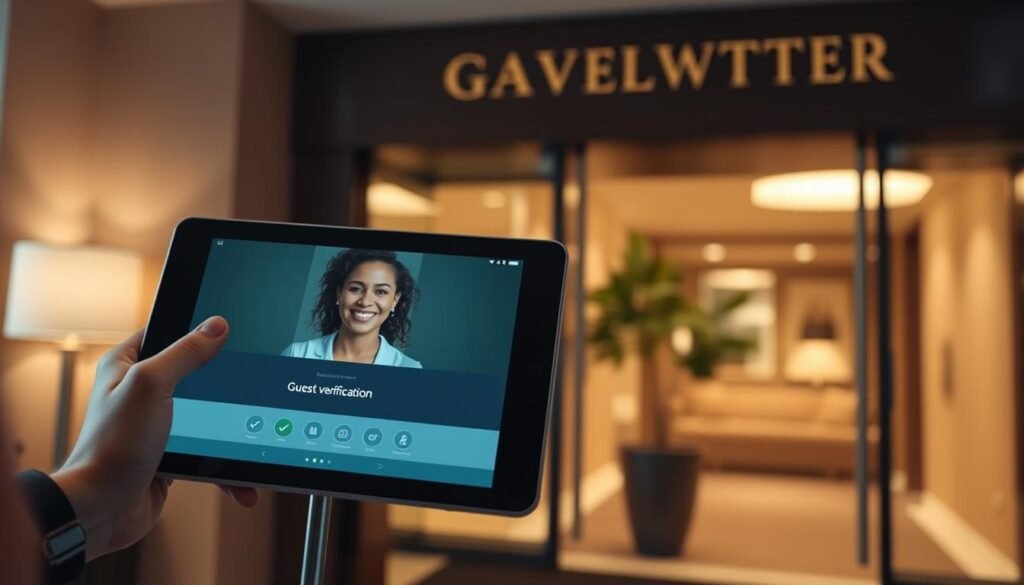
| Element | Purpose | Benefits |
|---|---|---|
| Identification Verification | Validate the guest’s identity | Detect fraudulent information, ensure accurate tenant records |
| Background Checks | Assess the guest’s criminal history, credit score, and legal records | Identify potential risks, make informed rental decisions |
| Financial History | Review the guest’s income sources, employment status, and credit history | Determine the guest’s ability to meet rental obligations, mitigate the risk of late or missed payments |
Types of Properties Requiring Guest Screening
When it comes to vacation rental screening, property protection, and renter qualification, not all properties are created equal. Different types of properties have unique screening needs to ensure a safe and successful rental experience. Let’s explore the key considerations for various property types.
Short-Term Rentals
For short-term rental properties, such as vacation homes or Airbnb-style accommodations, thorough vacation rental screening is essential. These properties often cater to a more transient guest population, making it crucial to verify the identity, background, and financial stability of each prospective renter. Screening can help protect the property from potential damage, noise disturbances, or other issues that may arise with short-term guests.
Traditional Lease Agreements
When it comes to long-term lease agreements, the renter qualification process takes on added significance. Landlords and property managers need to ensure that tenants have a reliable income, a clean credit history, and a track record of responsible tenancy. Rigorous property protection measures, including background checks and reference verification, can help mitigate the risks associated with long-term rentals.
Commercial Properties
For commercial properties, such as office spaces, retail units, or industrial facilities, the screening process may involve additional considerations. Alongside verifying the prospective tenant’s financial stability and business history, landlords and property owners may also need to assess the intended use of the space and potential impact on the surrounding area. Thorough guest screening can help protect the property’s value and maintain a thriving commercial ecosystem.

Regardless of the property type, a comprehensive guest screening process is essential for protecting your investment, maintaining the integrity of your rental portfolio, and fostering positive experiences for all stakeholders involved.
Developing Guest Screening Criteria
Establishing effective guest screening criteria is crucial for ensuring the right fit for your property and mitigating potential risks. This process involves defining an ideal guest profile, setting appropriate risk tolerance levels, and navigating the legal considerations to create a fair and compliant screening process.
Defining Your Ideal Guest Profile
Begin by identifying the characteristics and behaviors that align with your property’s unique needs. Consider factors such as the guest’s travel purpose, group size, length of stay, and any special requirements. Develop a clear understanding of your ideal tenant to guide your screening process and maximize the chances of securing reliable and responsible guests.
Establishing Risk Tolerance Levels
Determine your property’s risk tolerance by evaluating the potential impact of various guest behaviors, such as property damage, noise disturbances, or non-payment of rent. Carefully weigh the tradeoffs between maximizing occupancy and minimizing risk to establish appropriate screening criteria that balance your business objectives and risk mitigation strategies.
Legal Considerations
Ensure that your guest screening process complies with all relevant local, state, and federal laws, including fair housing regulations. Avoid discriminatory practices and make decisions based on objective, verifiable criteria. Stay informed about evolving legal requirements to maintain a screening process that is both effective and legally compliant.
| Screening Criteria | Ideal Guest Profile | Risk Tolerance Level |
|---|---|---|
| Purpose of Travel | Leisure, family vacation | Moderate |
| Group Size | 2-4 people | Low |
| Length of Stay | 3-7 nights | Moderate |
| Financial Stability | Verifiable income, good credit score | High |

By carefully defining your ideal guest profile, establishing appropriate risk tolerance levels, and ensuring compliance with legal requirements, you can develop a comprehensive guest screening process that supports your business objectives and enhances the overall experience for both you and your guests.
Tools and Technologies for Guest Screening
In the dynamic world of vacation rentals and short-term accommodations, property owners are leveraging a wide array of tools and technologies to enhance their guest screening processes. From online screening services to mobile apps and data analytics solutions, these innovative platforms are revolutionizing the way hosts identify and verify prospective guests, ensuring secure bookings and a positive experience for all.
Online Screening Services
Online screening services have become a game-changer for property owners, offering a comprehensive approach to guest verification. These platforms provide access to detailed background checks, identity verification, and even credit history assessments, empowering hosts to make informed decisions about their guests. By utilizing these online screening services, property owners can streamline the guest verification process, ensuring a secure and reliable booking experience.
Mobile Apps for Screening
- Convenience at your fingertips: Mobile apps designed for guest screening allow property owners to assess and verify guests on-the-go, providing instant access to essential information and decision-making tools.
- Enhanced identity verification: Many of these mobile apps integrate robust identity verification features, enabling hosts to confirm the authenticity of guest identities and prevent potential fraud or misrepresentation.
- Data-driven insights: Leveraging the power of mobile technology, these apps often provide data-driven insights and analytics, helping property owners identify trends, patterns, and potential risks in their guest screening processes.
Data Analytics in Guest Screening
The integration of data analytics into guest screening has transformed the way property owners evaluate and manage their rental portfolios. Advanced data analytics tools can identify potential red flags, detect suspicious activity, and provide predictive insights based on historical guest data. By harnessing the power of data-driven decision-making, hosts can make more informed choices about their guests, ultimately enhancing guest verification, secure bookings, and identity verification processes.
| Tool | Key Features | Benefits |
|---|---|---|
| Online Screening Services | – Background checks – Identity verification – Credit history assessment | – Streamlined guest verification – Informed decision-making – Secure bookings |
| Mobile Apps for Screening | – On-the-go guest assessment – Enhanced identity verification – Data-driven insights | – Convenience – Fraud prevention – Improved risk management |
| Data Analytics in Guest Screening | – Identification of red flags – Detection of suspicious activity – Predictive insights | – Data-driven decision-making – Enhanced guest verification – Improved portfolio management |
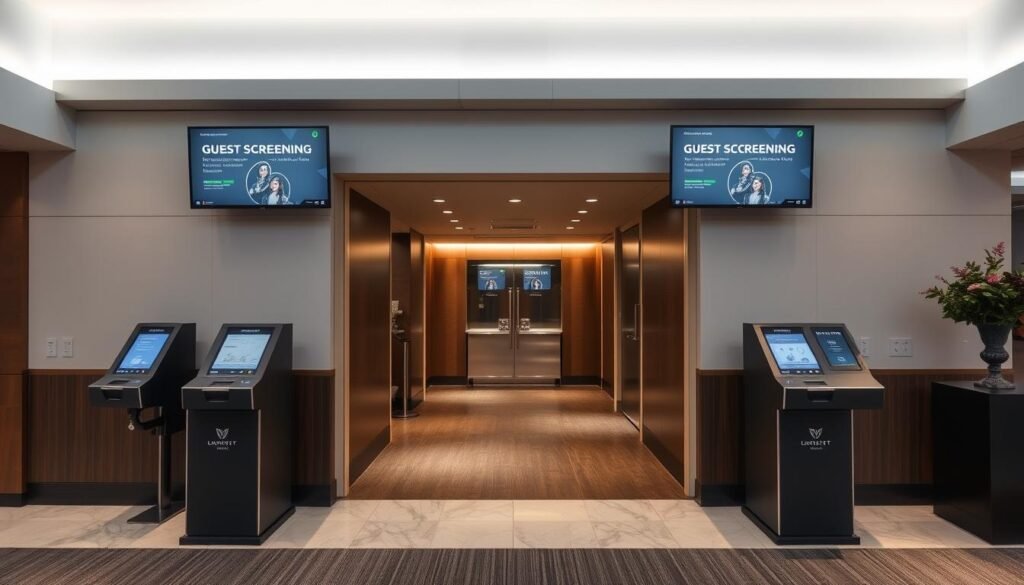
By embracing these innovative tools and technologies, property owners can elevate their guest screening processes, ensuring compliance with local regulations, reducing risk, and fostering a secure and enjoyable experience for both hosts and guests.
Crafting a Guest Application Form
As a property owner or manager, crafting an effective guest application form is crucial in ensuring the right fit for your property. This form serves as the foundation for your tenant screening process, allowing you to gather essential information and make an informed decision about potential renters. In this section, we’ll explore the key elements to consider when designing a user-friendly and legally compliant guest application.
Essential Information to Include
The guest application form should collect a comprehensive set of details about the prospective renter. This typically includes their full name, contact information, employment status, income sources, and previous rental history. Additionally, you may want to gather details about the intended occupants, pet information, and any special needs or accommodations required.
Designing for User Friendliness
To encourage potential renters to complete the application, it’s crucial to design the form with user-friendliness in mind. Utilize a clean and organized layout, with clear instructions and intuitive field placements. Consider incorporating digital signatures and secure file uploads to streamline the application process. Remember, a well-designed form can significantly improve the renter qualification experience for both you and the applicant.
Complying with Fair Housing Laws
When crafting your guest application form, it’s essential to ensure compliance with fair housing laws. Avoid any questions or requests for information that could be considered discriminatory based on protected characteristics such as race, color, religion, national origin, sex, disability, or familial status. Maintain a consistent and unbiased approach to ensure a fair and equitable tenant screening process.

By carefully considering these elements, you can create a guest application form that not only collects the necessary information but also fosters a positive and compliant renter qualification experience. Remember, a well-designed form can significantly improve your ability to identify and select the right tenants for your property.
Conducting Background Checks
As a property owner or manager, conducting thorough background checks on potential guests is a critical step in the guest screening process. Background checks can provide valuable insights into a guest’s financial history, criminal record, and overall risk profile, helping you make informed decisions and mitigate potential liabilities.
What to Check in a Background Report
When reviewing a guest’s background, be sure to examine the following key elements:
- Credit history and financial stability
- Criminal record and any past legal issues
- Eviction history or any previous issues with landlords
- Verification of identity and address information
Interpreting Background Check Results
Once you have the background report, take the time to carefully analyze the findings. Look for any red flags or concerning information that may indicate a higher risk guest. Consider factors such as the severity and recency of any issues, as well as the overall pattern of behavior.
Handling Adverse Findings
If the background check reveals adverse information, it’s important to handle the situation with care and comply with all applicable laws and regulations. Clearly communicate the reasons for any guest denials, and provide a fair appeal process. Remember, your goal is to balance risk mitigation with maintaining a positive guest experience.

By conducting thorough background checks and properly interpreting the results, you can effectively identify potential risks and make informed decisions to protect your property and your business. This crucial step in the guest screening process can help you build a portfolio of trustworthy, reliable guests and minimize the likelihood of costly incidents.
Assessing Guest References
When it comes to [vacation rental screening], verifying guest references is a crucial step in ensuring the right fit for your property. By thoroughly assessing past host feedback, you can gain valuable insights into a guest’s behavior, reliability, and overall compatibility with your rental offering.
Importance of Verifying References
Checking guest references allows you to validate the information provided during the application process and uncover any potential red flags. This step can help you [protect your property] and avoid potential issues, such as property damage, noise complaints, or other disruptive behavior.
Questions to Ask Past Hosts
- How would you describe the guest’s overall behavior and adherence to your property rules?
- Did the guest respect the condition of your rental and treat it with care?
- Were there any incidents or issues during the guest’s stay?
- Would you feel comfortable hosting this guest again in the future?
Evaluating Reference Feedback
Carefully reviewing the feedback from past hosts can help you [ensure the right fit for your property]. Look for consistent positive comments, as well as any potential concerns or warning signs. Consider the overall tone and sentiment of the references to get a well-rounded understanding of the guest’s track record.
The content provides essential safetytips for Airbnb hosts, emphasizing the importance of verifying guests’ identities, establishing clear rules, and securing property and finances through insurance
“Thorough guest reference checks are essential for [vacation rental screening] and [property protection]. They provide valuable insights that can help you make informed decisions about potential guests.”

| Positive Feedback | Negative Feedback |
|---|---|
| Respected property rules | Caused property damage |
| Communicated well with host | Received noise complaints |
| Left the rental in good condition | Violated guest policies |
By thoroughly [assessing guest references], you can make more informed decisions and [ensure the right fit for your property], ultimately enhancing the overall experience for both you and your guests.
Understanding Local Laws and Regulations
As a property owner or manager, it’s crucial to stay informed about the local laws and regulations governing tenant screening and secure bookings. Compliance with these rules is not only a legal requirement but also a vital step in risk mitigation and ensuring a positive experience for both you and your guests.
Fair Housing Awareness
One of the key considerations in the tenant screening process is adherence to fair housing laws. These laws prohibit discrimination based on factors such as race, color, religion, national origin, sex, familial status, and disability. Property owners must ensure their screening criteria and practices do not unlawfully exclude or disadvantage any protected groups.
State-Specific Screening Requirements
In addition to federal fair housing regulations, many states and municipalities have their own laws and guidelines governing the tenant screening process. This may include restrictions on the types of information that can be collected, the duration for which records can be retained, and the use of credit checks or criminal background checks. Property owners must research and comply with all applicable state-specific requirements.
Compliance with Privacy Laws
The collection and handling of personal information during the tenant screening process are subject to privacy laws. Property owners must ensure they have the necessary permissions and follow proper protocols for storing, accessing, and securing sensitive data. Failing to comply with privacy regulations can lead to legal consequences and erode guest trust in the secure bookings process.

By staying informed about local laws and regulations, property owners can navigate the tenant screening process with confidence, while upholding their legal obligations and maintaining a reputation for ethical and responsible practices. This not only protects the property but also fosters a sense of trust and security for prospective guests seeking secure bookings.
Building Trust with Guests
Establishing trust is crucial when it comes to guest verification and ensuring the right fit for your property. By fostering transparent communication and addressing guest concerns effectively, you can create a positive and property protection experience that keeps guests coming back.
Communication Guidelines
Clear and responsive communication is the foundation of building trust with potential guests. Proactively address any questions or concerns they may have, and be upfront about your guest verification process. Maintain a friendly, yet professional tone, and ensure that your language is easily understandable.
Establishing a Transparent Process
Transparency is key when it comes to your guest verification procedures. Provide detailed information about the steps involved, the criteria you use to assess guests, and the timeline for the process. This will help set realistic expectations and demonstrate your commitment to ensuring the right fit for your property.
Addressing Guest Concerns
Inevitably, some guests may have concerns or reservations about the guest verification process. Approach these situations with empathy and a willingness to find a mutually beneficial solution. Listen to their feedback, acknowledge their perspectives, and work collaboratively to address any property protection issues or misunderstandings.
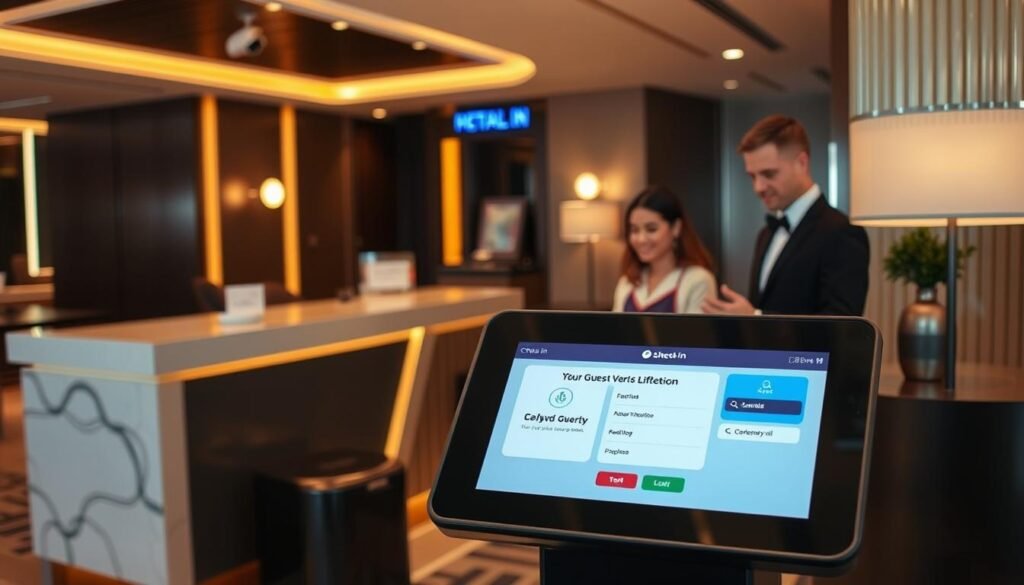
| Communication Strategies | Transparency Tactics | Addressing Concerns |
|---|---|---|
| – Prompt responses – Friendly, professional tone – Clear explanations | – Detailed process overview – Criteria for assessment – Realistic timelines | – Active listening – Empathetic approach – Collaborative problem-solving |
By implementing these best practices, you can foster a sense of trust and confidence with your guests, leading to a more property protection experience and a stronger reputation for your business.
Creating a Screening Policy
As a property owner, establishing a comprehensive screening policy is essential for ensuring a seamless and secure booking process. This policy serves as a guidepost, outlining the key steps to effectively evaluate potential guests and mitigate potential risks. By documenting screening procedures, maintaining policy consistency, and training staff on best practices, you can elevate the overall guest experience while safeguarding your property investment.
Documenting Screening Procedures
The foundation of a robust screening policy lies in clearly documenting the required screening procedures. This includes detailing the information needed from prospective guests, such as identification verification, background checks, and financial history reviews. By outlining these steps, you can ensure a standardized approach that promotes fairness and transparency throughout the renter qualification process.
Policy Consistency and Fairness
Consistency and fairness are paramount when implementing your screening policy. Ensure that the criteria and evaluation methods are applied uniformly across all applicants, regardless of personal attributes or preferences. This not only upholds fair housing laws but also reinforces the credibility of your secure bookings process, building trust with both current and future guests.
Training Staff on Screening Practices
Empowering your staff with comprehensive training on the screening policy is a crucial step in maintaining the integrity of your risk mitigation efforts. Equip your team with the knowledge and skills to effectively navigate the screening process, from identifying red flags to communicating denial decisions with professionalism and sensitivity. By fostering a well-informed and proactive staff, you can seamlessly execute your screening protocols and deliver a superior guest experience.
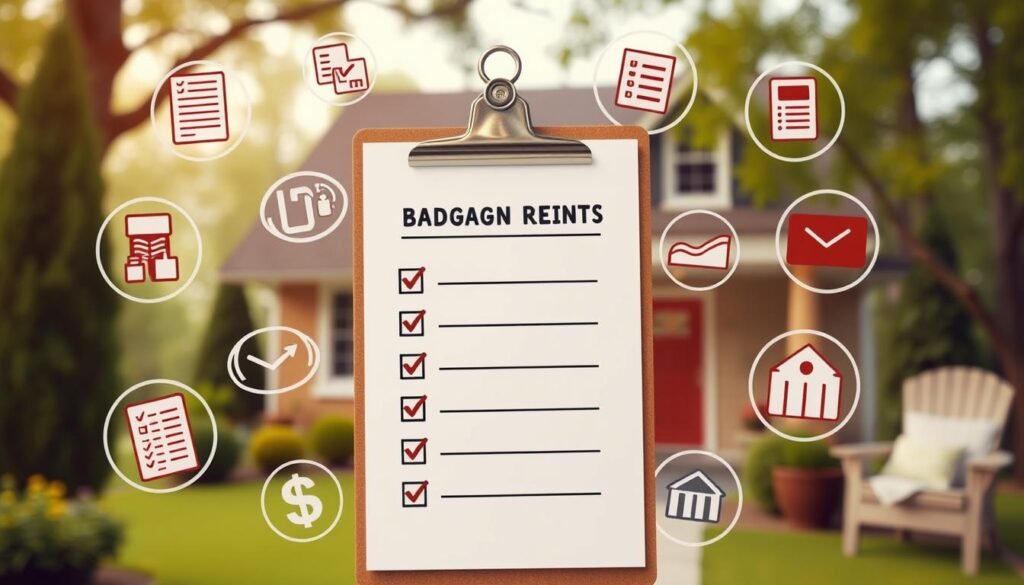
“A well-crafted screening policy is the cornerstone of a successful vacation rental business, safeguarding your property and fostering positive guest relationships.”
Handling Guest Denials and Appeals
In the realm of tenant screening, the decision to deny a guest access to your property is never an easy one. However, it is often necessary to protect your investment and ensure the right fit for your property. As a responsible property manager, it is crucial to handle guest denials and appeals with professionalism, empathy, and a commitment to fairness.
Communicating Denial Reasons
When informing a guest of their denial, it is essential to provide clear and concise reasons for the decision. Transparency is key, as it helps build trust and demonstrates your commitment to ensuring the right fit for your. Avoid vague or subjective language, and instead, cite specific criteria that the guest did not meet, such as poor credit history, negative references, or non-compliance with your tenant screening policies.
Offering a Fair Appeal Process
- Establish a clear and structured appeal process that allows guests to contest the denial decision.
- Designate an impartial party to review the appeal, ensuring a fair and unbiased assessment.
- Provide the guest with a reasonable timeline for the appeal review and a clear explanation of the next steps.
Learning from Denial Feedback
Every guest denial presents an opportunity to review and refine your property protection strategies. Gather feedback from denied guests to understand their perspectives and identify areas for improvement in your tenant screening process. Analyze the patterns and trends in your denials to fine-tune your criteria, address any gaps in your screening procedures, and enhance your overall decision-making process.
| Reason for Denial | Percentage of Total Denials | Feedback Received |
|---|---|---|
| Poor Credit History | 35% | Guests requested more transparency in credit score requirements and opportunities for explanation. |
| Negative References | 25% | Guests expressed a desire for a more detailed feedback process from previous hosts. |
| Non-compliance with Policies | 40% | Guests suggested clearer communication of property rules and expectations during the application stage. |
By handling guest denials and appeals with care and using the feedback to refine your ensuring the right fit for your property strategies, you can build a reputation for fairness and transparency, ultimately enhancing the overall guest experience and protecting your valuable assets.

Continuous Improvement of Screening Process
In the ever-evolving landscape of vacation rental management, maintaining an effective guest screening process is a dynamic endeavor. Savvy property managers understand the value of continuously evaluating and refining their vacation rental screening procedures to ensure they remain relevant and impactful.
Gathering Data on Guest Experiences
One of the keys to improving your guest verification process is collecting detailed feedback from guests. Implement post-stay surveys, rating systems, and open-ended questionnaires to gain insights into the guest experience. Analyze this data to identify pain points, areas of concern, and opportunities for enhancing your risk mitigation efforts.
Adapting to Changing Market Trends
The vacation rental industry is constantly evolving, with new technologies, regulations, and market demands emerging. Property managers must stay vigilant, monitoring industry trends and adjusting their vacation rental screening protocols accordingly. This may involve incorporating new background check methods, updating screening criteria, or leveraging emerging guest verification tools.
Integrating Feedback for Process Enhancements
Effective risk mitigation strategies require an open and responsive approach. Property managers should actively solicit feedback from both guests and internal stakeholders, such as housekeeping staff and maintenance teams. By analyzing this input, they can identify areas for improvement and implement targeted enhancements to the screening process, ultimately creating a more streamlined and effective system.
| Key Metrics to Track | Data Points to Collect | Frequency of Review |
|---|---|---|
| Guest Satisfaction Scores | Post-stay survey responses, online reviews | Monthly |
| Booking Conversion Rates | Number of inquiries vs. confirmed bookings | Quarterly |
| Incident Reports | Number and nature of guest-related issues | Bi-weekly |
| Screening Process Efficiency | Time to complete screening, number of touchpoints | Monthly |
By embracing a culture of continuous improvement, vacation rental providers can refine their guest verification practices, enhance the overall experience for guests, and mitigate potential risks to their properties and reputation.

The Role of Social Media in Guest Screening
In the digital age, a guest’s online presence has become a crucial element in the screening process for Airbnb hosts. By evaluating a potential guest’s social media profiles, you can gain valuable insights that can help ensure the right fit for your property and minimize risks. [https://sociosbnb.com/top-10-tips-for-first-time-airbnb-hosts-hosting-guide/]
Evaluating Online Presence
Thoroughly reviewing a guest’s social media accounts, such as Facebook, Twitter, and Instagram, can provide a wealth of information about their personality, interests, and behavior. This can help you assess whether they align with your ideal guest profile and are likely to be respectful and responsible during their stay.
Harnessing Social Media Insights
Social media can also offer insights into a guest’s travel history, reviews from previous hosts, and any potential red flags that may warrant further investigation. By leveraging these insights, you can make more informed decisions about who to welcome into your property and ensure the right fit for your needs.
Privacy Concerns with Social Media Checks
While social media screening can be a valuable tool, it’s crucial to address any privacy concerns and ensure that your screening practices comply with applicable laws and regulations. Establish clear policies and guidelines to protect the privacy of your guests while still maintaining a robust screening process.
By integrating social media into your guest screening process, you can gain a more comprehensive understanding of your potential guests, ultimately leading to a more successful hosting experience and ensuring the right fit for your property. [https://sociosbnb.com/top-10-tips-for-first-time-airbnb-hosts-hosting-guide/]
| Benefit | Description |
|---|---|
| Personality Assessment | Evaluate a guest’s personality, interests, and behavior through their social media profiles. |
| Verification of Travel History | Review a guest’s previous travel experiences and reviews from other hosts. |
| Identification of Red Flags | Detect potential issues or concerns that may require further investigation. |

“Integrating social media into your guest screening process can provide valuable insights and help ensure the right fit for your property.”
Preparing for Guest Arrivals
As the final stage of the guest screening process, preparing for guest arrivals is crucial to ensuring a smooth and secure booking experience. This involves taking a few key steps to verify guest details, set clear expectations, and have a comprehensive checklist in place for the check-in day.
Final Verification Steps
Before welcoming guests to your property, it’s essential to conduct a final verification of their information. This includes double-checking identification, reviewing the background check results, and confirming the guest’s financial history and references. By taking these final verification steps, you can help protect your property and ensure that the right guests are occupying your space.
Setting Expectations for Guests
Clear communication with guests is key to a successful arrival and stay. Be sure to set expectations upfront, outlining the rules, regulations, and any specific requirements for your property. This not only helps to maintain property protection but also ensures that guests are well-informed and can plan accordingly, leading to secure bookings and positive experiences.
Day-of Checklist for Check-in
- Verify guest identification and compare with booking details
- Confirm receipt of security deposit or any other required payments
- Provide a tour of the property and explain any necessary instructions
- Review the rental agreement and have the guest sign it
- Distribute keys, access codes, or other necessary items
- Conduct a final walkthrough to ensure the property is in optimal condition
- Address any last-minute questions or concerns from the guest
By following this comprehensive renter qualification checklist, you can help ensure a seamless check-in process and set the stage for a memorable guest experience.
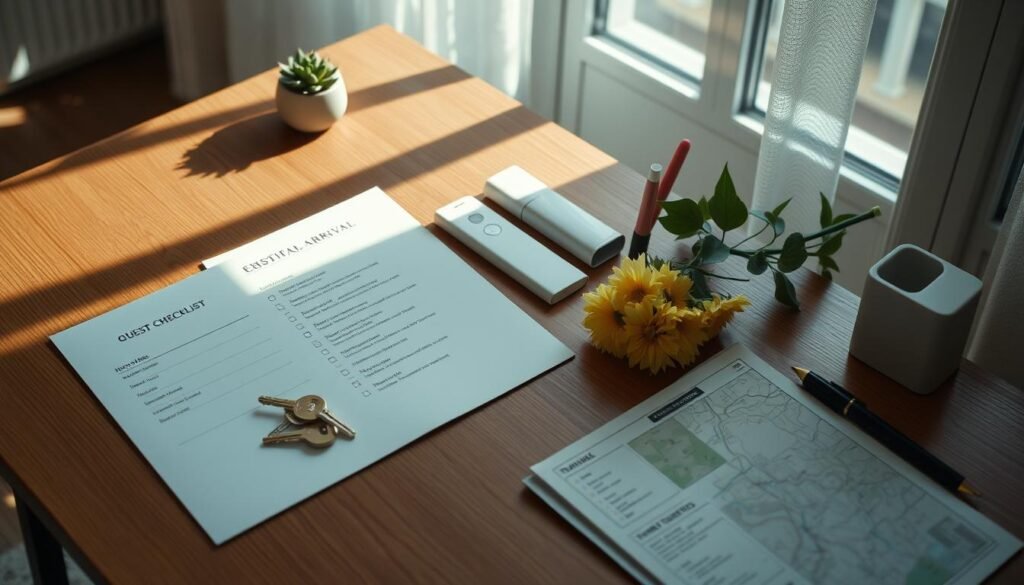
Conclusion: The Long-term Benefits of Effective Guest Screening
Implementing a robust guest screening process is not just a necessary step in managing your property; it’s an investment in the long-term success and reputation of your business. By ensuring the right fit for your property, you can reap the rewards of enhanced property reputation, reduced risk and liability, and the fostering of positive guest experiences.
Enhancing Property Reputation
A well-executed guest screening process sends a clear message to potential guests: your property values quality, reliability, and a positive overall experience. This reputation attracts discerning travelers who appreciate the care and attention you’ve put into vetting your guests, further strengthening your position in the vacation rental market and setting you apart from the competition.
Reducing Risk and Liability
Effective guest screening helps mitigate the risks associated with hosting, whether it’s property damage, noise complaints, or legal issues. By thoroughly vetting each guest, you can make informed decisions and minimize the likelihood of disruptive or problematic situations, protecting both your property and your business from potentially costly liabilities.
Fostering Positive Guest Experiences
When you take the time to screen guests and select those who align with your property’s offerings and your ideal guest profile, you set the stage for positive, memorable experiences. This, in turn, leads to satisfied guests, positive reviews, and repeat business – all of which contribute to the long-term success and profitability of your vacation rental operation.
FAQ
What are the key benefits of effective guest screening for property owners?
Effective guest screening can provide property owners with several benefits, including reduced property damage, improved guest experiences, and lower risk of liability. By thoroughly vetting potential guests, property owners can ensure the right fit for their property and protect their investment.
What are the essential elements of a comprehensive guest screening process?
A comprehensive guest screening process typically includes identity verification, background checks, and assessment of financial history. Property owners should also consider legal considerations, establish risk tolerance levels, and define an ideal guest profile to ensure a thorough and compliant screening process.
How can property owners leverage technology to enhance their guest screening efforts?
There are various technological tools available to streamline and improve guest screening, such as online screening services, mobile apps, and data analytics solutions. These tools can help property owners verify guest identities, conduct background checks, and gather insights to make more informed decisions about potential tenants.
What legal considerations should property owners be aware of when developing a guest screening policy?
Property owners must ensure their guest screening policies and practices comply with fair housing laws, state-specific requirements, and privacy regulations. It is essential to understand and adhere to these legal guidelines to avoid discrimination issues and maintain ethical screening procedures.
How can property owners build trust and transparency with guests during the screening process?
Establishing clear communication guidelines, creating a transparent screening process, and addressing guest concerns effectively can help build trust and foster positive relationships with potential tenants. Property owners should strive to strike a balance between thorough screening and a welcoming, professional approach.
Why is it important for property owners to continuously improve their guest screening process?
Ongoing improvement of the guest screening process is crucial to adapt to changing market trends, incorporate guest feedback, and enhance the overall effectiveness of the vetting procedures. Property owners should regularly gather data on guest experiences, analyze trends, and make updates to their screening policies to ensure they remain effective and compliant.
How can social media be leveraged in the guest screening process, and what are the associated privacy concerns?
Social media can provide valuable insights into a guest’s online presence and behavior, which can supplement the screening process. However, property owners must be mindful of privacy concerns and ensure that any social media checks are conducted in a fair and ethical manner, in accordance with applicable laws and regulations.
What are the final steps property owners should take to prepare for guest arrivals after the screening process?
Before guest arrivals, property owners should perform final verification checks, set clear expectations with guests, and have a comprehensive checklist in place to ensure a smooth check-in process. These steps help maintain control over the property and create a positive experience for the incoming guests.



